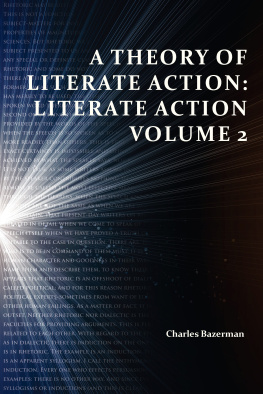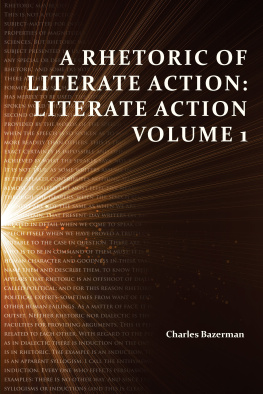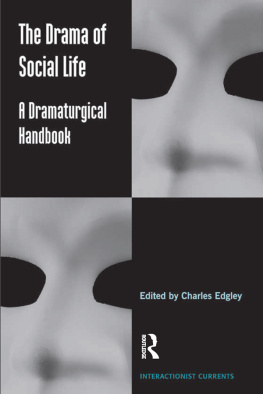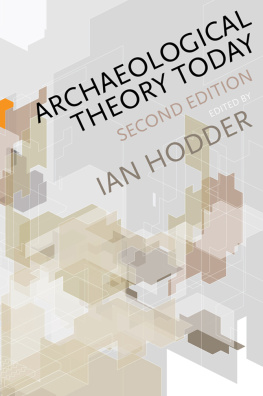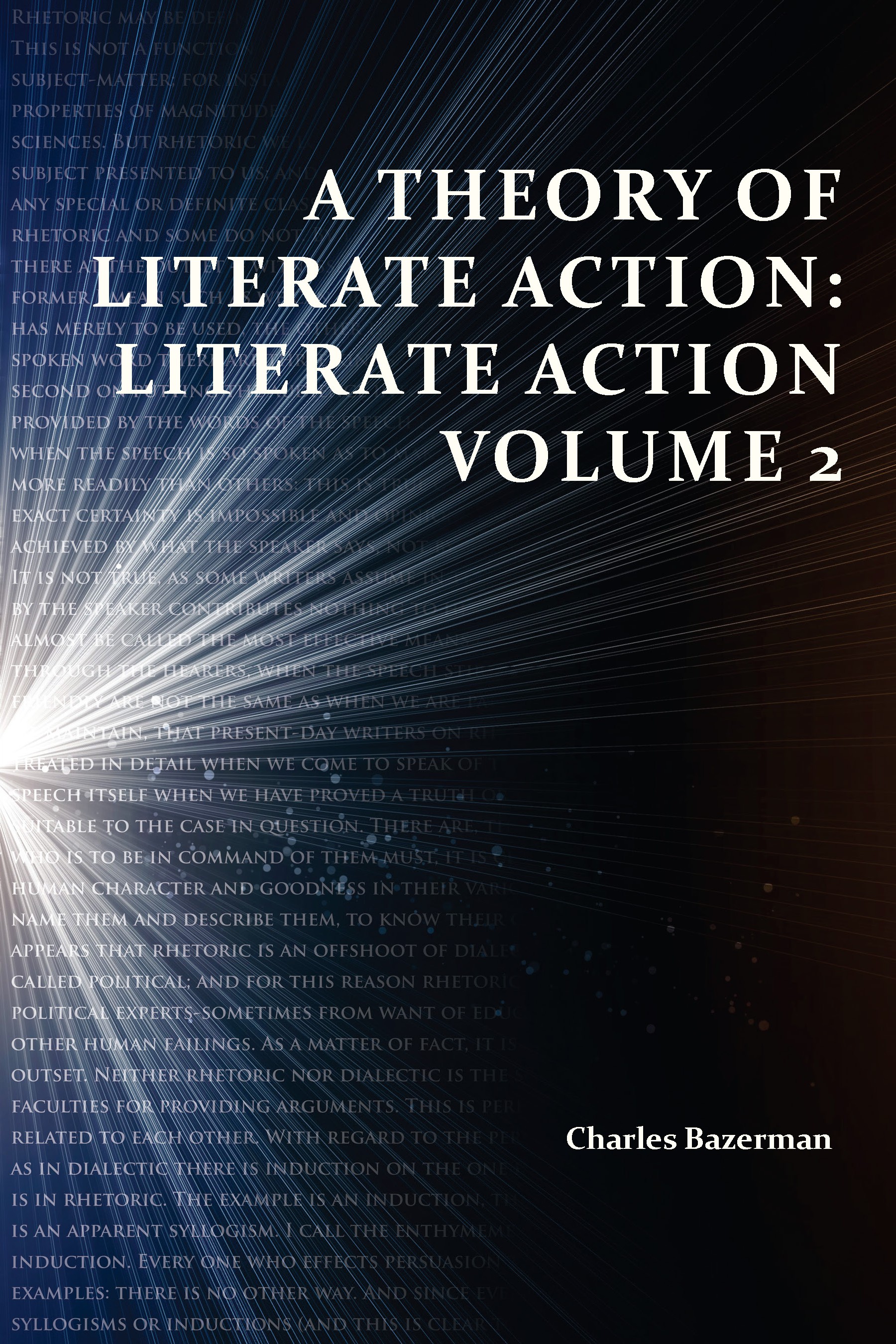A Theory of Literate Action: Literate Action, Volume 2
By Charles Bazerman
The WAC Clearinghouse
Fort Collins, Colorado
Parlor Press
www.parlorpress.com
Anderson, South Carolina
PERSPECTIVES ON WRITING
Series Editor, Susan H. McLeod
The Perspectives on Writing series addresses writing studies in a broad sense. Consistent with the wide ranging approaches characteristic of teaching and scholarship in writing across the curriculum, the series presents works that take divergent perspectives on working as a writer, teaching writing, administering writing programs, and studying writing in its various forms.
The WAC Clearinghouse and Parlor Press are collaborating so that these books will be widely available through free digital distribution and low-cost print editions. The publishers and the Series editor are teachers and researchers of writing, committed to the principle that knowledge should freely circulate. We see the opportunities that new technologies have for further democratizing knowledge. And we see that to share the power of writing is to share the means for all to articulate their needs, interest, and learning into the great experiment of literacy.
Recent Books in the Series
Katherine V. Wills and Rich Rice (Eds.), ePortfolio Performance Support Systems: Constructing, Presenting, and Assessing Portfolios (2013)
Mike Duncan and Star Medzerian Vanguri (Eds.), The Centrality of Style (2013)
Chris Thaiss, Gerd Bruer, Paula Carlino , Lisa Ganobcsik-Williams, and Aparna Sinha (Eds.), Writing Programs Worldwide: Profiles of Academic Writing in Many Places (2012)
Andy Kirkpatrick and Zhichang Xu, Chinese Rhetoric and Writing: An Introduction for Language Teachers (2012)
Doreen Starke-Meyerring, Anthony Par, Natasha Artemeva, Miriam Horne, and Larissa Yousoubova (Eds.), Writing in Knowledge Societies (2011)
Martine Courant Rife, Shaun Slattery, and Dnielle Nicole DeVoss (Eds.), Copy(write): Intellectual Property in the Writing Classroom (2011)
David Franke, Alex Reid, and Anthony Di Renzo (Eds.), Design Discourse: Composing and Revising Programs in Professional and Technical Writing (2010)
Publication Information
The WAC Clearinghouse, Fort Collins, Colorado 80523-1052
Parlor Press, 3015 Brackenberry Drive, Anderson, South Carolina 29621
Copyright 2013 by Charles Bazerman . This work is licensed under a Creative Commons Attribution-Noncommercial-No Derivative Works 3.0 United States License.
Printed in the United States of America
Library of Congress Cataloging-in-Publication Data Pending
A Theory of Literate Action: Literate Action Volume 2 / by Charles Bazerman.
pages cm. -- (Perspectives on writing)
Includes bibliographical references.
ISBN 978-1-60235-477-7 (pbk.: acid-free paper) -- ISBN 978-1-60235-478-4 (hardcover: acid-free paper) -- ISBN 978-1-60235-479-1 (adobe ebook) -- ISBN 978-1-60235-480-7 (epub)
Copyeditor: Don Donahue
Designer: Mike Palmquist
Series Editor: Susan H. McLeod
The WAC Clearinghouse supports teachers of writing across the disciplines. Hosted by Colorado State University, it brings together scholarly journals and book series as well as resources for teachers who use writing in their courses. This book is available in digital format for free download at .
Parlor Press, LLC is an independent publisher of scholarly and trade titles in print and multimedia formats. This book is available in paperback, cloth, and Adobe eBook formats from Parlor Press at .
Contents
A Theory of Literate
Action: Literate Action, Volume 2
Introduction
Aristotle set the terms for rhetoric over 2500 years ago. Classical rhetoric established a powerful, useful, and enduring set of concepts for producing and critically evaluating persuasive statements in the public sphere. Its concepts provide means of reflective understanding and choice - making relevant for the class of language productions it arose fromnamely high stakes , public , oral performances on matters of deliberative and judicial governance and occasions of commitment to state enterprises. As a consequence of the success of the institutions it reflected on, modern institutions of governance have tended to rely on and replicate the forms of citizenship embodied in classical rhetoric, thereby giving enduring relevance to rhetorical categories.
Yet the world imagined by rhetoric is far from the whole social and communicative world. Even in ancient Greece and Rome, the same agora where rhetoric was established contained discursive worlds of sales and contracts. And when rhetors went home, they engaged in a variety of familial and intimate discourses. All of these would have gained from a reflective understanding and informed choice making, but they were not the subject of rhetorical theorizing. Furthermore, institutions and forms of social participation have expanded greatly in the last two millennia, in large part fostered by the affordances of literacy. The presence of literacy over the last five thousand years has given rise to many new genres, has transformed social life , and has given rise to new forms of social organization dependent on writing as a communicative infrastructure, a repository of knowledge , and as a collection or recorded commitments. Academic work, scientific disciplines, and government bureaucracies are held together by the reading and writing of texts. Only a small part of these texts could conveniently be labeled as persuasive in any traditional sense. Even law (which in the courtroom can be seen as paradigmatic of rhetoric) now is much a matter of libraries, filings, briefs, and case files as it is of dramatic courtroom oratory.
At the end of chapter one of the companion volume, A Rhetoric of Literate Action, I rapidly reviewed the history of rhetorical theorys attempts to address the problematics of writing and produce a workable rhetoric to guide us in navigating the literate world. I concluded there that we still have yet to reconceive rhetoric fundamentally around the problems of written communication rather than around rhetorics founding concerns of high stakes, agonistic, oral public persuasion.
A further reason to rethink rhetoric is the emergence of social science over the past century, to provide us new understandings of individuals and societies, and how individuals interact and participate in societies. The social sciences now provide strong tools to reconceive what it is we accomplish through writing and how we go about accomplishing it. In this volume I explicitly present the conceptual grounds for the theory I propose in terms of major schools of contemporary social scientific thought. Most basically, I draw on sociocultural psychology, phenomenological sociology, and the pragmatic tradition of social science. Based on an account of human sociality and communication that arises at the intersection of these, I consider the kinds of orders embodied in texts and on which texts relysocial, linguistic, textual, and psychological. I particularly attend to the problem of communication across time and space among humans who biologically evolved social and communicative capacities in face-to-face activities. With the emergence of literacy as part of human cultural evolution, new kinds of relations and activities formed that have created structures of participation in larger and more distant organizations, relying on accumulating knowledge and mediated through genre-shaped texts. It is for these activity contexts that individuals must produce texts, mobilizing the resources of language, and it is within these contexts that the texts will have their effect. Near the end of the book, at the end of Chapter 10, I summarize the theoretical path traveled in the book in a way that can also serve to guide us on the way:

